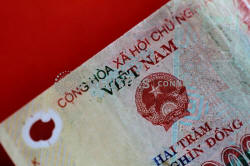Exclusive: Vietnam intervened in currency markets weeks after U.S.
censure: sources
 Send a link to a friend
Send a link to a friend
 [February 11, 2021] By
Phuong Nguyen and Tom Westbrook [February 11, 2021] By
Phuong Nguyen and Tom Westbrook
HANOI/SINGAPORE (Reuters) - After being
branded a "currency manipulator" by the United States in December for
trying to keep the dong from rising in value, Vietnam is again
intervening in foreign exchange markets and using what traders say is an
unusual method to do so, according to six people familiar with the
matter and a review of an interbank trading message.
Early in January, the State Bank of Vietnam (SBV) told some local banks
it would cease its regular purchase of U.S. dollars in the spot market,
where the trade settles within days, according to two senior currency
traders and an analyst, who all work at local banks and have direct
involvement in the trades.
The central bank offered the local banks an attractive deal instead: It
would agree to buy dollars at a favourable rate for delivery in July,
and it would allow the local banks to cancel this agreement before
mid-June if they wished, according to the three sources and a review of
trading instructions sent by the SBV for one such transaction.

The new method of intervention, which has not been previously reported,
put downward pressure on the dong but without money changing hands right
away, which the sources said could help avoid drawing U.S. attention to
the trades and any further consequences for bilateral relations. For a
graphic, click https://tmsnrt.rs/3aT8V0K
The SBV did not respond to requests for comment.
There is no suggestion of any wrongdoing by Vietnam. Many central banks
intervene regularly in currency markets. Vietnam has consistently said
its currency policies aimed to maintain stability and control inflation,
not seek trade advantage.
"We do not have anything public to share at this time," a Treasury
official said in an emailed response to Reuters' queries about Vietnam's
foreign exchange practices.
Vietnam, which has seen a surge in export-led growth as manufacturing of
electronics and other goods, has increasingly shifted to the Southeast
Asian nation, especially from China after its trade war with Washington.
A higher value of the dong because of its trade surplus could hurt this
growth in the middle of a pandemic.
Nguyen Xuan Binh, who is head of research at KB Securities in Hanoi and
familiar with the trades but not directly involved with them, said the
delayed delivery of dollars meant Vietnam's central bank could avoid
triggering one of the conditions behind the U.S. label: buying dollars
in six of 12 consecutive months.
The Treasury's semi-annual report to Congress, which examines exchange
rate policies of major trading partners, said in December that Vietnam's
currency management was aimed at creating "unfair competitive advantage
in international trade."
It said Vietnam met all the conditions that trigger the currency
manipulator designation, including "persistent, one-sided intervention"
in the currency market.
The stakes are high for Vietnam since further interventions after the
currency manipulator label could trigger a U.S. response, such as new
tariffs on its goods. The next U.S. review is slated for April.
[to top of second column] |

A Vietnam Dong note is seen in this illustration photo May 31, 2017.
REUTERS/Thomas White/Illustration/File Photo

MARKET IMPACT
Under its January deals, the SBV offered the local banks an above-market rate of
23,125 dong per dollar, according to the three sources and written trading
messages sent by the central bank. That rate is a premium of about 0.5% on
current spot prices.
If the dong were to rise further between January and June, it would increase the
premium over spot prices for the banks. And if the dong were to weaken below
23,125, they could then cancel the deal and sell dollars in the spot market
instead.
Reuters could not determine the size of the SBV's intervention, but the three
traders said it was large enough to create demand for dollars in the market,
which put downward pressure on the dong.
The currency's value in the black market, where the dong is often traded in the
real economy, has fallen 1.1% as the traders said dollar supply may have dried
up.
UNUSUAL FORWARDS
SBV's new transactions resemble financial derivatives known as forwards, which
bind parties to exchange currencies at a future date at an agreed upon rate, the
three sources said.
Forwards contracts offer several advantages to central banks. They do not
require cash up-front and can help smooth out sudden shifts in reserves. Indeed,
they are popular with other Asian central banks, such as those in India, Taiwan
and South Korea.
But four of the people familiar with the transactions said SBV's agreements were
not typical forward contracts, as they gave banks the option to cancel the deal
without significant costs.
Two of them said the SBV had offered similar options previously, around 2015,
although then it had been selling dollar forwards in order to try and support a
sliding value of the dong.

As the SBV previously preferred to use three-month forward contracts, all six
sources familiar with the transactions said the shift to a longer time frame
suggested a desire to buy time before the intervention drew U.S. attention or
pressure.
The SBV did not respond to questions about its approach.
(Reporting by Phuong Nguyen in Hanoi and Tom Westbrook in Singapore. Additional
reporting by James Pearson and Khanh Vu in Hanoi and David Lawder in Washington.
Editing by Vidya Ranganathan, Paritosh Bansal and Edward Tobin)
[© 2021 Thomson Reuters. All rights
reserved.] Copyright 2021 Reuters. All rights reserved. This material may not be published,
broadcast, rewritten or redistributed.
Thompson Reuters is solely responsible for this content. |